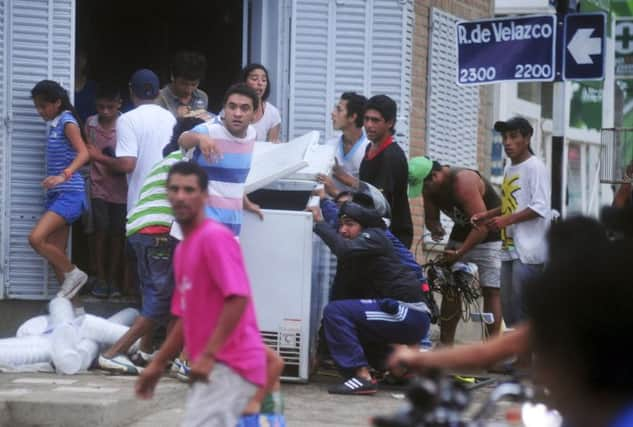Five killed as police strikes cripple Argentina


The unrest started a week ago in the second city, Cordoba. There, a stand-off over pay led to a strike, after the governor closed brothels he said were a source of income for corrupt officers.
Riots and looting ensued, as police demanded an above-inflation rise and refused to answer call-outs. (Inflation in Argentina is running at 30 per cent a year.) Many worried shopowners armed themselves and some started to fire on looters.
Advertisement
Hide AdAdvertisement
Hide AdGovernor Jose de la Sota, a rival of president Cristina Fernandez de Kirchner, settled the walkout by effectively doubling police salaries to 12,000 pesos a month, or about £560.
Officers elsewhere took notice and, in what has become known as the Cordoba effect, began staging their own walkouts, leaving cities undefended.
So far, only provincial police have gone on strike, in 19 of Argentina’s 23 provinces. The 60,000-strong federal police have not joined the action.
The death toll climbed to at least five by late Monday – four suspected looters and one shop-owner, who died inside his premises after a mob set it on fire. Hundreds of people have been injured, and thousands of shops and homes robbed.
Two people died in the initial violence in Cordoba. Firefighters then found a shopkeeper’s body in the burned-out shell of his shop in Almirante Brown, in Buenos Aires province, where Fernandez loyalist governor Daniel Scioli appealed for calm. The fourth and fifth victims were young men who were inside shops being looted in Entre Rios and Jujuy provinces.
Banks, supermarkets, retail businesses and public transport have shut down in many of Argentina’s cities just as a summer heatwave has taken hold.
Ms Fernandez has remained silent, but her cabinet chief, Jorge Capitanich, said the looting was organised and amounted to “treason” aimed at creating chaos on the eve of the 30th anniversary of Argentina’s return to democracy.
Yesterday marked three decades since the swearing-in of president Raul Alfonsin ended the 1976-1983 dictatorship. But the late president’s MP son, Ricardo, said celebrations might have to be postponed, “given what’s happening.”
Advertisement
Hide AdAdvertisement
Hide Ad“I wonder if it wouldn’t be healthier to take advantage of this formal act of memory and have the government and all political sectors commit together to defend the democracy and its institutions and work without speculations to ensure domestic peace,” he said.
The government sent federal forces to hot spots, and prosecutors were put on alert to build criminal cases against looters. Justice minister Julio Alak warned people found to be co-ordinating violence through social networks would be prosecuted.
As the violence has spread, even close presidential allies have struggled to find money for police salaries of less than 6,000 pesos (£280) a month. Most Buenos Aires officers agreed to a pay rise that brought entry-level salaries up to what Mr Scioli called a “fair and reasonable” 8,570 pesos (£400), but some are still on strike holding out for 12,500 pesos.